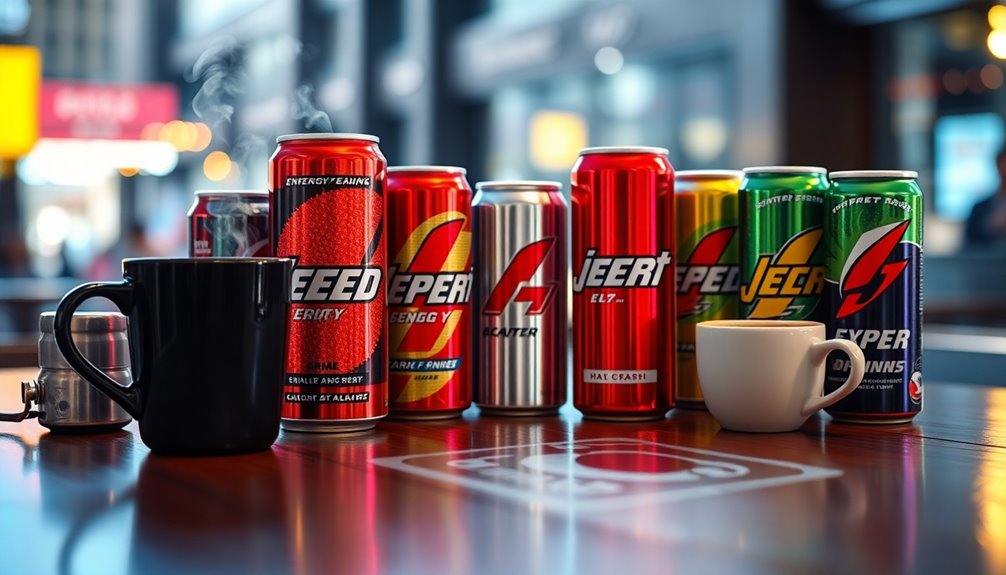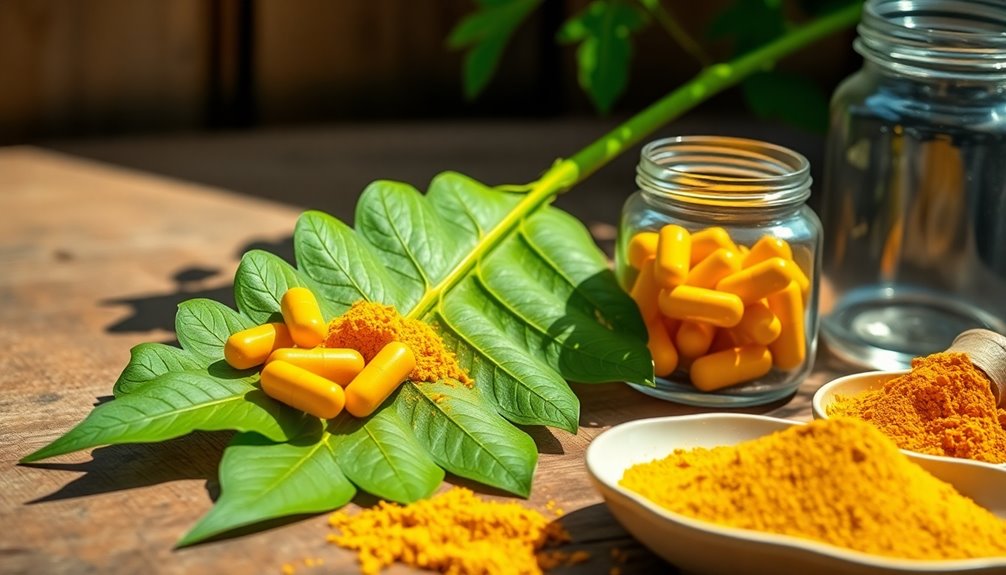Caffeine levels in popular energy drinks can really vary. For instance, Rockstar Unplugged and V8 Energy pack 80 mg per serving, while Red Bull has the same amount in an 8.4 oz can. If you're looking for more energy, Monster Energy serves up 160 mg, and a 16 oz Bang Energy hits 300 mg. Health-conscious options like Celsius BCAA and Monster Ultra contain around 100-150 mg. Remember, the FDA recommends a max daily intake of 400 mg for adults. So, if you want to know which drink suits your needs best, there's more to uncover about their unique flavors and benefits.
Key Takeaways
- Rockstar Unplugged and V8 Energy contain 80 mg of caffeine per serving, ideal for moderate energy needs.
- Monster Energy packs 160 mg of caffeine in a 16 oz can, providing a stronger boost.
- Bang Energy offers a high caffeine content of 300 mg in a 16 oz can, targeting serious energy seekers.
- 5-hour Energy shots contain 200 mg of caffeine in a 2 oz serving, a concentrated energy source.
- The FDA recommends a maximum daily caffeine intake of 400 mg for adults, promoting safe consumption.
Caffeine Content Rankings
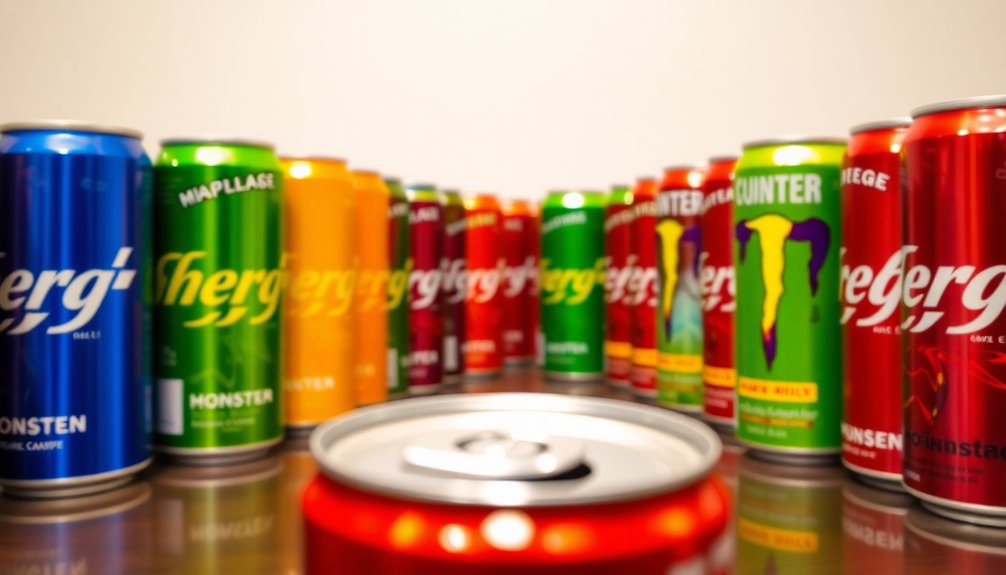
When you're looking for an energy boost, knowing the caffeine content in various energy drinks can make all the difference.
Popular energy drinks contain a wide range of caffeine levels. For a light option, Rockstar Unplugged and V8 Energy both offer 80 mg of caffeine in their respective servings.
If you're seeking a moderate kick, Monster Energy provides 160 mg in a 16 oz can, while Monster Hydro contains 150 mg in a larger bottle.
For those craving a stronger punch, Bang Energy leads the pack with a whopping 300 mg in a 16 oz can.
Finally, 5-hour Energy stands out with 200 mg in just a 2 oz shot, rivaling a strong cup of coffee.
Choose wisely!
Health-Conscious Options
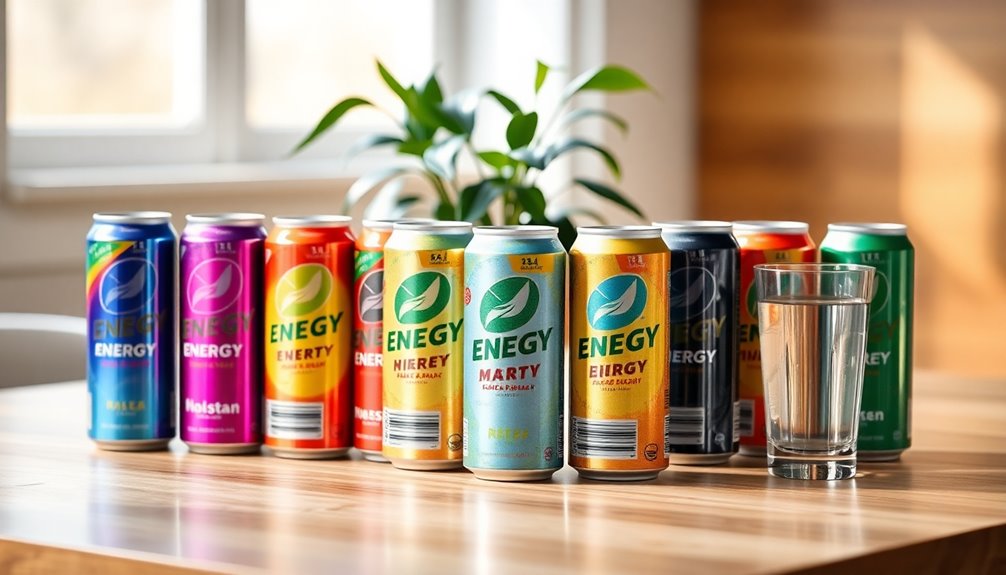
As you explore healthier energy drink options, you'll find a variety of choices that balance caffeine content with nutritional benefits.
Rockstar Unplugged offers a sugar-free, calorie-free experience with 80 mg of caffeine in a 12 oz can.
If you prefer a blend of fruits and veggies, V8 Energy provides 80 mg of caffeine in an 11.5 oz can without added sugar.
Celsius BCAA focuses on hydration and recovery, featuring 100 mg of caffeine in a 12 oz can along with electrolytes and BCAAs.
For those seeking lower calories, Monster Ultra packs 150 mg of caffeine in a 16 oz can, while Solimo Energy delivers 152 mg of caffeine in a zero-sugar format, making it a solid choice among health-conscious options.
Unique Flavor Offerings

Exploring unique flavor offerings in energy drinks can be an exciting journey for your taste buds. With so many options available, you'll find energy drink flavors that suit your preferences perfectly. Check out this table highlighting some standout selections:
| Brand | Flavor Combinations | Caffeine Content (mg) |
|---|---|---|
| Rockstar Unplugged | Blueberry, Passionfruit, Raspberry Cucumber | Varies by product |
| V8 Energy | Orange Pineapple, Peach Mango, Wildberry | 80 |
| Monster Ultra | Rosa, Violet, Peachy Keen | 150 |
From fruity blends to invigorating twists, these unique flavor offerings not only keep your palate intrigued but also cater to your energy needs. So, plunge into and discover your new favorite!
Performance and Energy Enhancement
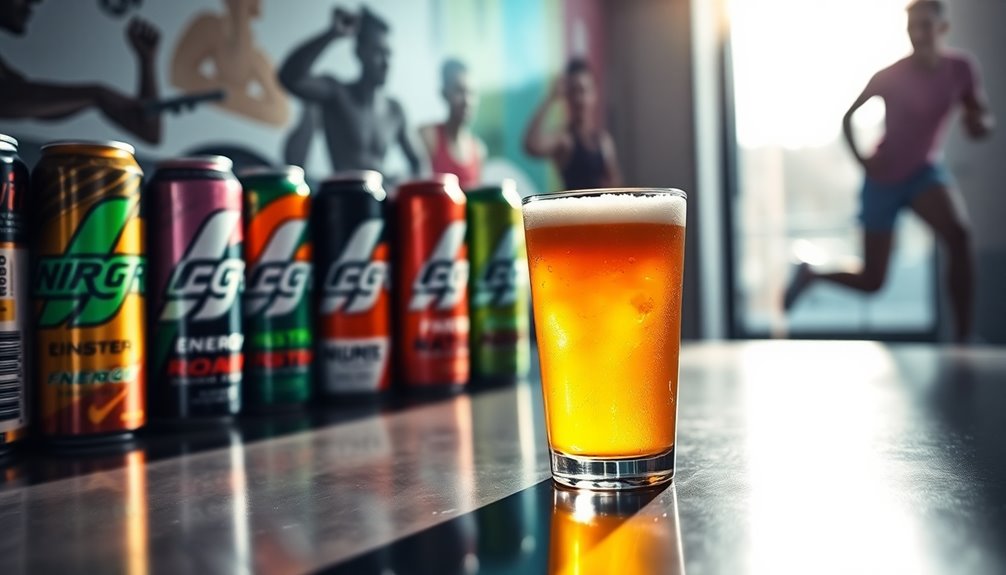
Energy drinks have become a popular choice for athletes and fitness enthusiasts seeking to enhance their performance and boost their energy levels.
With options like Bang Energy and Reign Total Body Fuel, both delivering 300 mg of caffeine per 16 oz can, you'll get a significant energy kick along with performance-enhancing ingredients like BCAAs.
C4 Energy offers 200 mg of caffeine, featuring CarnoSyn Beta-Alanine to help improve endurance.
If you prefer a lighter option, Essential Amin.o. Energy provides 100 mg of caffeine with amino acids for hydration during workouts.
Celsius BCAA also contains 100 mg of caffeine, focusing on hydration and recovery.
Choosing the right energy drink can help you achieve your performance goals while keeping your energy levels high. Additionally, audience engagement strategies can enhance your overall effectiveness in sports and fitness presentations.
Consumer Awareness and Choices
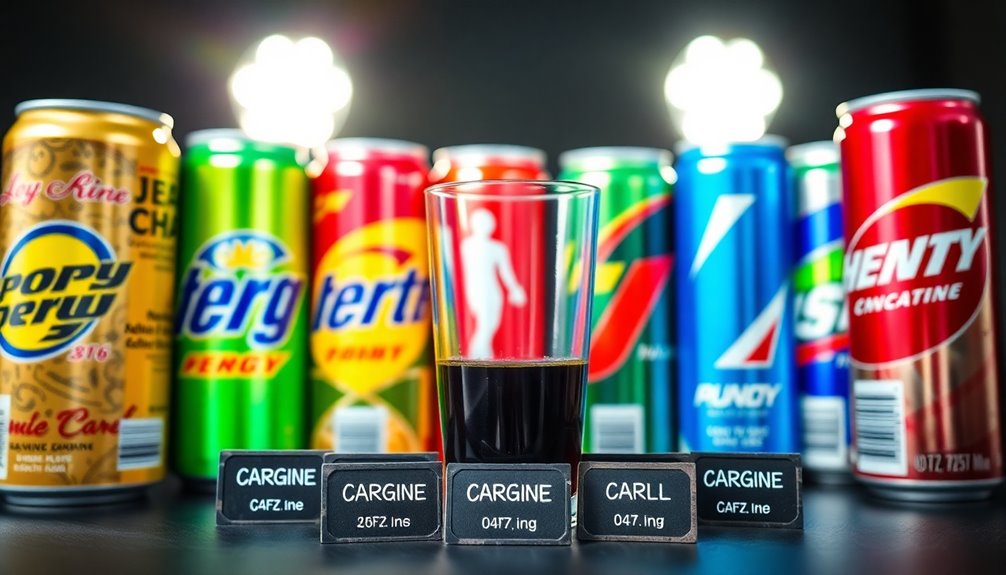
How aware are you of the caffeine content in your favorite energy drinks? Understanding what's in your drink is essential for making smart choices.
Many popular energy drinks, like Red Bull with 80 mg per 8.4 oz can and Monster Energy with 160 mg per 16 oz can, pack a punch in caffeine. The FDA suggests a maximum daily limit of 400 mg for adults, which can quickly add up.
With a growing demand for transparency, you might prefer brands that clearly label caffeine content and ingredients. Misconceptions can lead to surprises, as seen with 5-Hour Energy’s 200 mg in just a 2 oz shot. While some energy drinks may be upfront about their caffeine content, other products may not be as transparent. For example, many may not realize the high caffeine content in mountain dew, with a 12 oz can containing about 54 mg of caffeine. This lack of transparency can catch consumers off guard and lead to unintentional overconsumption of caffeine. Therefore, it is important for brands to be open and honest about the ingredients and caffeine levels in their products to help consumers make informed choices.
Increased scrutiny on caffeine levels is driving consumers toward lower-sugar and sugar-free options.
Frequently Asked Questions
How Much Caffeine Is in Popular Energy Drinks?
When you're reaching for an energy drink, it's essential to know how much caffeine it packs.
For instance, Red Bull gives you 80 mg in an 8.4 oz can, while Monster Energy offers up to 160 mg in 16 oz.
If you need a serious boost, Bang Energy delivers a hefty 300 mg.
Meanwhile, 5-Hour Energy's 2 oz shot packs 200 mg, making it a compact option for quick energy.
Always check the label!
What Is 200 Mg of Caffeine a Lot?
When it comes to caffeine, too much of a good thing can be bad.
So, is 200 mg a lot? For most adults, it's a moderate amount, roughly equivalent to two cups of coffee. You might find it energizing, but if you're sensitive to caffeine, it could lead to jitters or anxiety.
Always listen to your body. If you're feeling uneasy, it's best to cut back and find a balance that works for you.
Is 500 Mg of Caffeine a Lot?
Yes, 500 mg of caffeine is a lot. It exceeds the FDA's recommended maximum daily limit of 400 mg for most adults.
Consuming that much can lead to symptoms like increased heart rate, anxiety, and insomnia, particularly if you're sensitive to caffeine.
While some people might handle it without immediate issues, others could experience negative effects at lower doses.
It's important to be mindful of your intake to avoid potential health risks.
Is 300 Mg of Caffeine a Lot?
Yes, 300 mg of caffeine is a lot for most people.
It's nearly 75% of the FDA's recommended daily limit of 400 mg for adults. If you're sensitive to caffeine, this amount can lead to increased heart rates, anxiety, or insomnia.
Understanding your personal tolerance is essential, as reactions vary widely. If you're considering consuming this amount, be mindful of how it affects you and adjust accordingly.
Conclusion
In the world of energy drinks, knowing your caffeine content is like maneuvering through a bustling city—without a map, you might find yourself lost in a caffeine rush. Just like a well-planned route can save you time, understanding what you're consuming helps you make smarter choices. So, next time you grab that flashy can, remember: not all energy drinks are created equal. Choose wisely, and you'll keep your energy levels soaring without the crash.
